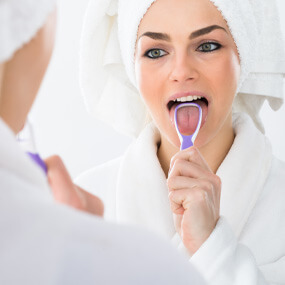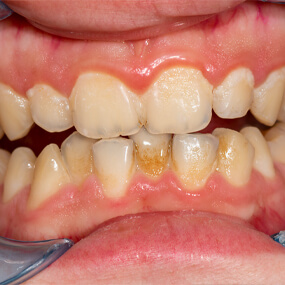Foods That Are Good for Your Teeth and Those That Aren’t

What you put in your body can have a dramatic impact on your overall health, and that goes for your oral health as well. Eating foods with simple carbohydrates helps to create an environment in your mouth in which bacteria can thrive. That leads to greater and faster accumulation of plaque, which is the leading cause of both tooth decay and gum disease. Plaque contains acids that erode your teeth as well as bacteria that can infect your gums and cause inflammation, but you can also help wear down your teeth by eating foods and drinking beverages that are high in acid. On the other hand, you can bolster your teeth and gums through the foods you choose, and with that in mind, let us consider some foods to embrace and others that are best avoided.
Foods That Bolster Oral Health
- Fiber-rich vegetables – The American Dental Association (ADA) recommends fiber-rich vegetables because they are loaded with nutrients but also because the fiber helps to clean the teeth and gums. The fiber promotes saliva production, which clears food particles, bacteria, and acids. Saliva also helps remineralize the teeth, and chewing also cleans the teeth directly and helps to exercise the teeth and jaw.
- Non-acidic fiber-rich fruits – The ADA also recommends fiber-rich fruits for similar reasons, but you should limit your consumption of citrus and other high-acidic fruits. When picking out your fruits and vegetables, strive for a diverse color range, which is an easy way to ensure that you are getting a wide range of nutrients.
- Dairy products – Most dairy products are excellent for oral health. Milk is rich in calcium and fortified with vitamin D, which helps to strengthen teeth. Cheese contains calcium too, but also promotes saliva production and neutralizes acids, which makes it an excellent addition to any acidic meal. Yogurt has calcium and vitamin D as well, but it also contains probiotics, which help to inhibit the growth of bad oral bacteria.
- Green and black tea – Black and green tea contain polyphenols, which are plant compounds that have antioxidant properties. They help to reduce inflammation in the mouth as well as inhibit pathogenic bacteria. Tea has been demonstrated in studies to help reduce cavities as well as bad breath. Be mindful that black tea can stain the teeth, so you may want to mitigate that with some milk or drink green tea instead.
- Beans – Beans are rich in many nutrients, including phosphates that remineralize the teeth and help with calcium absorption. While beans are good in all diets, they can play an important role in vegetarian, vegan, and similar diets since those people are not getting certain nutrients from meat.
- Eggs – Eggs contain many nutrients, including calcium, vitamin D, and zinc, that strengthen the teeth and help to remineralize them. You will also find many different vitamin Bs as well as vitamin A and folate.
- Avocados – Avocados contain many vitamins and minerals, which makes them a great addition to any diet. This includes high levels of potassium, which helps to avoid the loss of minerals in teeth and bones.
- Sweet potatoes – Sweet potatoes are loaded with vitamin A, which is essential to saliva production. But be mindful that many people tend to top sweet potatoes with items that undermine the benefits to oral health.
- Salami – Processed meats like salami should not have a prominent role in a healthy diet. However, salami in moderation can be an effective way to get K2, which helps to keep the teeth strong.
Foods That Undermine Oral Health
- Hard candies – While it is all right to treat yourself on occasion, it is generally recommended you do so with sweets that do not linger in the mouth. Hard candies are the exact opposite of that and assault your teeth with acids. Dark chocolate, on the other hand, has real health benefits and washes off the teeth quickly.
- Gummy candies – Gummy candies are just as bad, if not worse, because they get stuck in the nooks and crannies of your teeth. Exacerbating the issue is the fact that gummy candies tend to be highly acidic.
- Potato chips and other starchy foods – Starchy foods tend to get stuck in the teeth and contain simple carbs that quickly break down into sugar. Potato chips are terrible for oral health, and when you do snack, you have to take care to keep your teeth clean. This is true of white bread also, so opt for wheat and other whole grains instead.
- Carbonated soft drinks – Carbonated soft drinks are bad for the teeth due to the carbonation, acids, and sugars. Diet sodas may even be worse since the manufacturers up the acid content to compensate for the lack of sugar.
- Sports drinks and fruit juices – Sports drinks tend to be loaded with sugars and acids as well, and the zero-calorie versions are very high in acid. Fruit juices often contain what is bad about fruits without any of the good.
- Citrus fruits – Fruits like lemons, limes, and oranges are loaded with vitamins but also acids. Avoid flavoring your water with lemon and lime, and when you do eat citrus, aim to do so as part of a broader meal. The other food items, such as cheese, can promote saliva and help to neutralize the acid.
- Coffee – Not only does coffee stain your teeth, but it is highly acidic. It also tends to dry out the mouth, which increases the number of bacteria in the mouth as well as accelerates and amplifies the effects.
- Alcohol – Alcohol is bad for your teeth for a number of reasons, including simple carbs and drying out your mouth. In addition, people tend to make unhealthy food choices when they are drinking.
- Ice – Ice is often recommended as a dieting tool. While the water itself is good for you, chewing the ice wears down your tooth enamel and increases the risk of chipped teeth and other dental damage.
Adjusting Your Lifestyle for Better Oral Health
- Drink more water – Most adults do not drink enough water. It should be your main beverage and sipped throughout the day. It helps your saliva do its job and also ensures that your body can produce plenty of it.
- Eat sugary and acidic foods with meals – You get plenty of sugar from the good foods you eat. You never have to supplement your diet with sugar. Of course, some sugar and certainly acids are unavoidable, and if you eat them as part of meals, the effect is diminished because your mouth is producing a significant amount of saliva.
- Limit snacking – Many people undermine their otherwise good diets with snacking as well as disrupt their oral health. You should limit how much you do it, or snack on vegetables, nuts, and other healthy options.
- Avoid dry mouth – Hydration will help with this, but you should also avoid foods and beverages you know make your mouth dry. Medications can dry out your mouth as well. You should consult with your dentist, who may be able to recommend a fluoride rinse or other product that can help avoid the xerostomia.
- Brush and floss twice a day – The ADA recommends brushing twice a day: once after breakfast and again before going to bed. You should also floss and scrape your tongue whenever you brush. After other meals, you can rinse vigorously with water, floss, and chew sugar-free gum, which will all help to clean the teeth.
- Visit your dentist twice a year – Avoid the mistake of going to the dentist only because there is a problem. Catching oral health issues early on is the best way to avoid big problems as well as keep your dental care costs low.
Reach for Mouth-Healthy Foods
Balancing your diet with oral health in mind can make oral care easier and your efforts more productive. No matter how well you eat, however, you still need to brush and floss regularly and visit your dentist twice a year. At Scottsdale Cosmetic Dentistry Excellence, a skilled oral hygienist will clean your teeth, Jeffrey D. Clark, DDS, will perform a comprehensive exam, and you can discuss your diet choices with Dr. Clark. Schedule your next checkup by calling our office at 480 585 1853.




